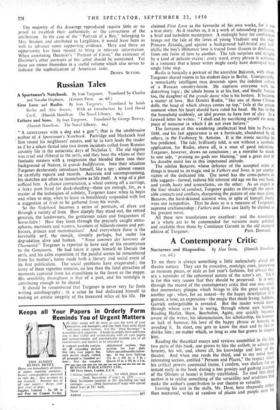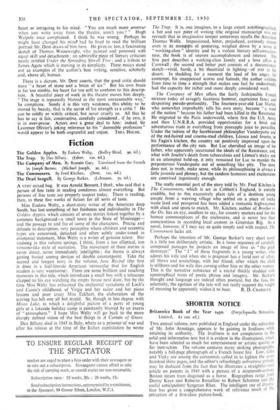A Contemporary Critic
Nocturnes and Rhapsodies. By Alan Dent. (Hamish Hamilton.
To me there is always something a little melancholy about old theatre notices. They can be evocative, nostalgic even, interesting as museum pieces, or stale as last year's fashions, but always they are a reminder of the ephemeral nature of the actor's art. Yd it is for this very reason that they should be preserved. It is only through the record of the contemporary critic that one may catch that momentary glimpse which brings to life the great acting of another age ; when, for an instant—by the happy description of a gesture, a tone, an expression—the magic that made Irving, Siddons, Garrick unforgettable is revealed. But the reader would know through whose eyes he is seeing, through whose ears hearing. Reading Hazlitt, Shaw, Beerbohm, Agate, one quickly becomes aware of the writer, his idiosyncrasies, his scholarship, his humour or lack of humour, his love of the happy phrase or honesty in avoiding it. In short, one gets to know the man and to like or dislike him ; no matter which, so long as one has grown to respect him.
Reading the theatrical essays and reviews assembled in the first two parts of this book, one grows to like the audio's, to admire his honesty, his wit, and, above all, his knowledge and love of the theatre. And when one reads the third, and to my mind most interesting section, entitled " Persons and Places," the respect which his critical powers command (mine, I confess, was shaken for an instant early in the book during a too gossipy and gushing account of the Oliviers at home) is firmly established. To read this third section is to realise something of the versatility and erudition that make the author's contribution to our theatre so valuable. Leaving his seat in the stalls, Mr. Dent, here rhapsodic rather than nocturnal, writes at random of places and people near his heart or intriguing to his mind.- " You are much more amateur when you write away from the theatre, aren't you ? " Hugh Walpole once complained. I think he was wrong. Perhaps he might have changed his mind' had he lived to read the brilliant portrait Mr. Dent draws of him here. He gives us, too, a fascinating sketch of Thomas Wainewright, who painted and poisoned with equal skill and detachment ; an admirable piece of literary criticism neatly entitled Under the Spreading Sitwell Tree ; and a tribute to James Agate which is moving in its simplicity. These essays stand out as examples of the author's best writing, sensitive, scholarly and, above all, human.
There is a dictum, Mr. Dent asserts, that the good critic should nave " a heart of stone and a brain of ice." But his own brain is far too nimble, his heart far too soft to conform to this descrip- tion. A beautiful piece of work in the theatre moves him deeply. " The stage is repeatedly blurred in the most unreasonable way," he complains. Surely it is this very weakness, this ability to be moved by beauty, that is the secret of his strength as a critic ? He can be coldly or wittily critical, but never cruelly so. All that he has to say is fair, constructive, carefully considered , if he errs, it is in over-praise. Actors owe a great deal to him: indeed, Sir Laurence Olivier's joking reference to his " damnable profession " would appear to be both ungrateful and unjust. THEA HOLME.







































 Previous page
Previous page